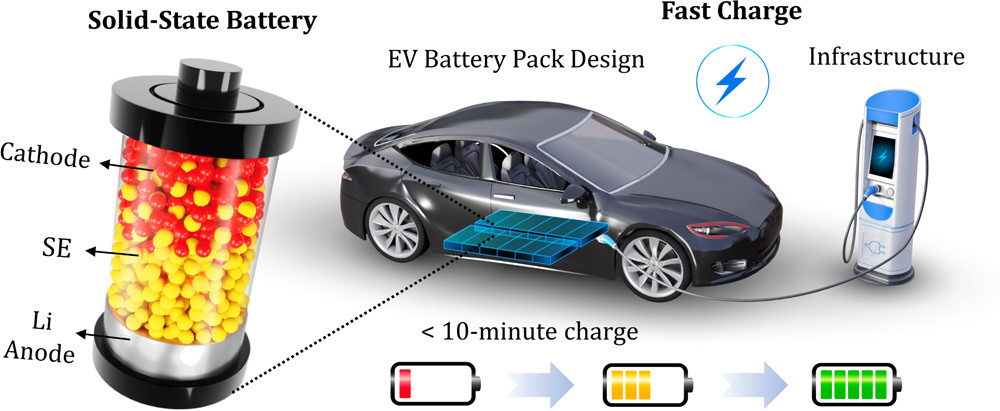Solid-State Batteries: Revolutionizing the Future of Electric Vehicles
Solid State Battery Electric Vehicles: The Future of EV?

What's the Buzz About Solid State Batteries?
Let's be honest, electric vehicles (EVs) are pretty awesome. They're quieter, cleaner, and potentially cheaper to run than their gas-guzzling counterparts. But they've got a few niggles, haven't they? Range anxiety, charging times that feel like an eternity, and the ever-present worry about battery safety are all valid concerns. Enter the superhero of the battery world: the solid-state battery. This isn't just an incremental improvement; it's a potential game-changer for solid state battery electric vehicles.
How Do Solid State Batteries Work?
Unlike the liquid or gel-based electrolytes in traditional lithium-ion batteries, solid-state batteries use, you guessed it, a solid electrolyte. This seemingly small change has HUGE implications. Think of it like this: a liquid electrolyte is like a wobbly jelly – prone to leaks and susceptible to damage. A solid electrolyte, on the other hand, is like a strong, stable brick wall. It's far less likely to leak or catch fire, leading to significantly improved safety.
This solid electrolyte also allows for a higher energy density. What does that mean for you? More range! And because they're more stable, they can handle faster charging speeds, potentially slashing charging times dramatically. It's like upgrading from a dial-up modem to 5G – a night and day difference.
Advantages of Solid State Battery Electric Vehicles
The benefits of solid state battery electric vehicles extend beyond just improved range and faster charging. Let's break them down:
- Enhanced Safety: The solid electrolyte significantly reduces the risk of fire and thermal runaway, making solid-state batteries inherently safer.
- Longer Range: The higher energy density translates to significantly longer driving distances on a single charge.
- Faster Charging: Solid-state batteries can handle much higher charging rates, reducing charging times considerably.
- Improved Longevity: They tend to have a longer lifespan, meaning fewer battery replacements over the vehicle's lifetime.
- Potential for Cost Reduction: While currently expensive to manufacture, advancements are being made to bring down the cost of solid-state batteries, making EVs more accessible to a wider range of consumers.
Challenges Facing Solid State Battery Technology
Now, let's not get carried away. Solid-state battery technology isn't a magical solution that's ready to roll out tomorrow. There are still some hurdles to overcome:
- Manufacturing Complexity: Producing solid-state batteries on a large scale is currently more complex and expensive than traditional lithium-ion batteries.
- Performance at Low Temperatures: Solid-state batteries can sometimes suffer from reduced performance in cold weather.
- Dendrite Formation: The formation of dendrites (tiny metallic filaments) can short-circuit the battery, reducing its lifespan. Researchers are actively working on solutions to mitigate this.
The Future of Solid State Battery Electric Vehicles
Despite these challenges, the future looks bright for solid state battery electric vehicles. Major automakers and tech companies are investing heavily in research and development, pushing the boundaries of this technology. We're seeing significant progress being made, with prototypes and even limited production runs already underway. It's likely that we'll see increasingly widespread adoption of solid-state batteries in EVs over the next decade, leading to safer, more efficient, and more affordable electric vehicles for everyone.
Solid State Battery Electric Vehicles: A Summary
Solid-state batteries represent a significant leap forward in battery technology. While challenges remain, the potential benefits – increased safety, longer range, faster charging, and improved longevity – are undeniably compelling. As research continues and manufacturing processes improve, we can expect to see solid state battery electric vehicles become the norm, transforming the automotive landscape and accelerating the transition to a sustainable transportation future.
Frequently Asked Questions
Q1: Are solid-state batteries better than lithium-ion batteries?
A1: Solid-state batteries offer significant advantages over traditional lithium-ion batteries in terms of safety, energy density, and charging speed. However, they are currently more expensive and face some technological challenges that need to be overcome.
Q2: When will solid-state battery EVs be widely available?
A2: While widespread availability is still a few years away, we are starting to see limited production runs and prototypes. Experts predict a wider rollout within the next decade, with gradual scaling and price reductions.
Q3: How much will solid-state battery EVs cost?
A3: Currently, the cost of solid-state batteries is higher than lithium-ion batteries, leading to a higher initial cost for the vehicles. However, as production scales up, costs are expected to decrease significantly, making them more competitive.
Q4: Will solid-state batteries solve range anxiety?
A4: Absolutely! The higher energy density of solid-state batteries translates to significantly increased range, addressing a major concern for EV drivers.
Q5: Are solid-state batteries environmentally friendly?
A5: The environmental impact of solid-state batteries is a complex issue. While they offer advantages in terms of safety and longevity, reducing the need for frequent battery replacements, the mining and processing of materials needed for their production still require careful consideration. Ongoing research focuses on more sustainable manufacturing processes.
